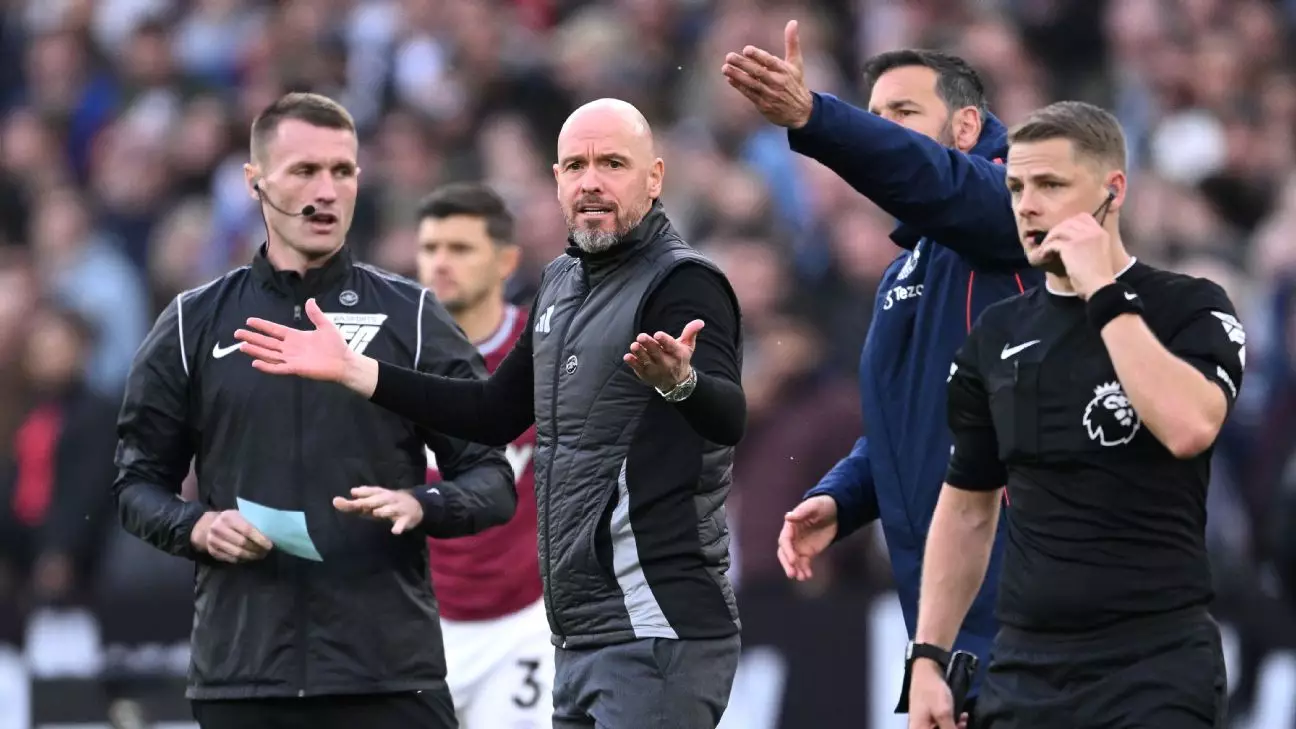In recent weeks, the Premier League has been engulfed in a storm of criticism, primarily revolving around the Video Assistant Referee (VAR) system and its application in crucial matches. A notable incident involved West Ham United being awarded a contentious penalty in their match against Manchester United, a decision that has had far-reaching consequences, including the dismissal of manager Erik ten Hag just one day later. The broader implications of such decisions underscore the increasing scrutiny on officiating in football and the essential need for clarity in the implementation of technology in match officiating.
The Fateful Match: A Decision Under Scrutiny
The match on October 27, which ended 2-1 in favor of West Ham, was tightly contested until the final minutes when a challenge between Matthijs de Ligt and Danny Ings led to a controversial penalty call. Initially, referee David Coote allowed play to continue, but after a review prompted by VAR’s Michael Oliver, he was instructed to view the incident on the pitchside monitor. Ultimately, he awarded a penalty that Jarrod Bowen converted, sealing the game for West Ham.
Howard Webb, the Premier League’s chief refereeing officer, has since acknowledged that the intervention by VAR was misguided. He articulated that the threshold for VAR involvement was not met in this situation, criticizing the focus on de Ligt’s leg rather than the play that had already advanced past him. This admission reveals a growing discontent regarding the VAR’s role in potentially altering significant outcomes in matches based on insufficient evidence.
The Ripple Effect of Officiating Errors
The aftermath of the penalty decision was immediate and harsh, particularly for Erik ten Hag, whose tenure at Manchester United was under pressure due to the team’s poor start to the season. This incident serves as a litmus test for how officiating decisions can have monumental consequences for teams and managers. The dismissal of a coach under such circumstances raises questions about the accountability of match officials and the systems in place to support them.
Furthermore, this scenario distinguishes itself from others in the realm of officiating errors by illustrating how human error and technological oversight can collide, leading to outcomes that reverberate beyond the pitch. The psychological impact on players and staff after such contentious decisions cannot be underestimated. Losing a match due to a perceived injustice can demoralize a team and, conversely, electrify the opposing side, casting a shadow on the integrity of the competition itself.
Webb’s comments also extended to other recent instances, such as the case involving Arsenal’s William Saliba. The VAR’s decision to recommend a red card for denying an obvious goal-scoring opportunity contrasted starkly with the judgment surrounding the West Ham penalty. Webb articulated that the initial yellow card issued on the field for Saliba was incorrect, highlighting an inconsistency in how VAR evaluates critical match incidents.
The disparate application of VAR in different scenarios raises fundamental questions regarding its reliability. For supporters and players alike, understanding when VAR will intervene and when it will not remains firmly ambiguous. This inconsistency breeds frustration among fans, as seen in recent discussions about missed penalties, disallowed goals, and incorrect card decisions throughout the league. With the current season demonstrating a marked decrease in identified VAR errors compared to previous years—down from 13 to just three so far—one cannot escape the impression that the officials are perhaps overly cautious or inconsistent in their decision-making.
As VAR continues to be woven into the fabric of Premier League football, there lies a pressing need for governing bodies to refine the technology’s implementation. The introduction of clearer guidelines for what constitutes a “clear and obvious” error, along with enhanced training for match officials, could foster a greater level of trust between fans, players, and the officials themselves.
In addition, periodic reviews of officiating standards and technology application should be transparent to the public. A robust dialogue within the football community about these issues will enable the sport to move toward a fairer and more equitable framework for making decisions.
The events surrounding the West Ham versus Manchester United clash exemplify the evolving landscape of football officiating. As scrutiny heightens and fans demand accountability, the call for innovation in the use of technology becomes increasingly urgent. Whether the VAR system can rise to meet these challenges remains to be seen, but its future will undeniably shape the narrative of the Premier League.

Leave a Reply